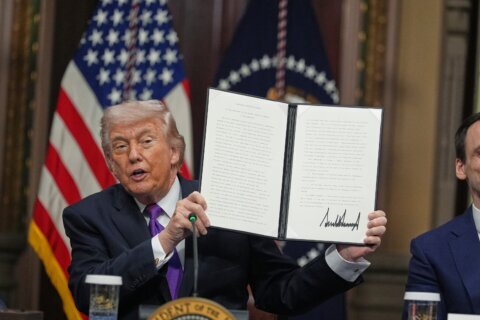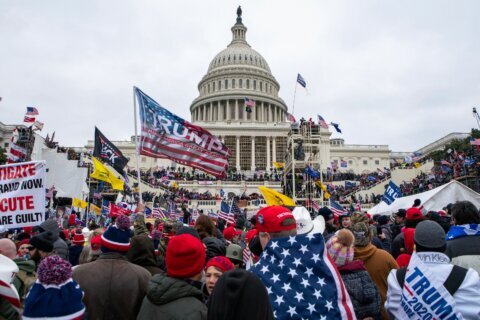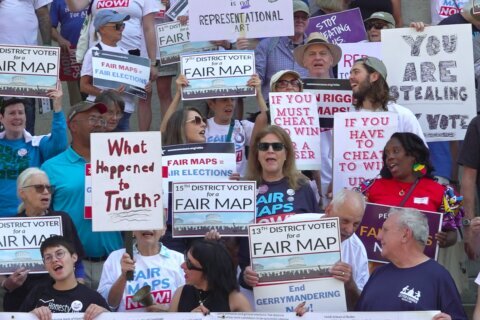RICHMOND, Va. (AP) — Gov. Glenn Youngkin elaborated Thursday about the concerns that he said prompted his decision to end an apparent effort by Virginia to land a large electric vehicle battery plant.
Youngkin’s action on the joint venture between Ford Motor Co. and a Chinese company, which he first disclosed last week, has drawn some support but also hefty criticism. The Republican governor’s detractors, almost all Democrats, argue he put his political ambitions ahead of a chance to secure a major job-creation project.
Youngkin’s administration has previously characterized the project as a “front” for the Chinese Communist Party that would raise national security concerns. He defended his decision again Thursday in remarks with reporters, saying removing the removing the state from consideration was in the best interest of Virginia taxpayers.
Youngkin — a former private equity executive who hasn’t publicly ruled out a 2024 presidential bid — also said he had concerns about whether the structure of the project would have run afoul of federal Inflation Reduction Act incentives. He said it further could have tied up a premier industrial site for something that might ultimately be unsuccessful.
Youngkin’s administration has consistently said that the project never reached end-stage talks. Speaking after an event Thursday, Youngkin said the state never submitted an incentive package for the project, which was considering a megasite in rural southern Virginia, according to his spokeswoman.
“I stopped the submission of a proposal into it from the very beginning,” he said.
Melissa Miller, a spokesperson for Ford, said Thursday that the company has not made a site selection decision.
“Beyond that, our talks with CATL, the world’s leading battery producer, continue,” she wrote in an email.
She did not respond to a request for comment about Youngkin’s criticisms.
Virginia House Democratic Leader Don Scott made the case Thursday that Youngkin should try to reverse course and salvage the project.
“He wanted to make headlines by calling Ford — Ford — a front for China. And who’s paying the price? Twenty-five hundred hard-working Virginians,” Scott said, in a reference to the number of jobs some news outlets have reported would be associated with the project.
State officials declined to confirm that number to The Associated Press.
House Majority Leader Terry Kilgore defended the governor, saying Youngkin had acted on legitimate concerns and preserved the megasite for other prospects.
“Governor Younkin and his team looked at this and decided this was not the best deal for Virginia,” he said.
Around $200 million has been spent on the site Youngkin’s office said was under consideration, the Southern Virginia Megasite at Berry Hill, in order to make it attractive to major employers. The site is located in Pittsylvania County near Danville, in a region that’s seen a long economic decline from the loss of tobacco and textile jobs.
But Conrad Layson, senior analyst with AutoForecast Solutions, said it’s unlikely that Ford would have considered Virginia for a joint-venture battery plant given the state’s relatively long distance from electric vehicle assembly plants.
Ford could justify locating a plant in Virginia if the incentive package was strong enough, but it would have to overcome the increased cost of shipping batteries, Layson said.
In addition, a number of battery cells die in transit and have to be scrapped if they are shipped long distances, he said. Because of this, automakers like to locate battery plants near where vehicles are made, he said. Ford has electric vehicle manufacturing plants in Mexico and near Detroit, and it’s building one near Memphis in western Tennessee.
“This was a political move on Governor Youngkin’s part. Nothing more,” Layson said.
The secrecy with which economic development projects are routinely conducted in Virginia means some aspects of the apparent site selection talks and Youngkin’s intervention remain murky.
Miller, the Ford spokesperson, said she was “limited in what I can share due to the confidential nature of the site selection processes.”
Youngkin’s press office would not confirm the number of jobs or possible investment that would have been associated with the project. Nor did his press office respond to questions about where the governor seeks counsel about matters of national security.
Suzanne Clark, a spokesperson for VEDP, declined to answer basic questions from AP.
“For competitive reasons and to protect confidential company information, we cannot comment on current or potential economic development prospects,” she said.
Matt Rowe, the economic development director for Pittsylvania County, said he was unable to make any comment on “any projects real or perceived.”
____
AP Auto Writer Tom Krisher contributed to this report from Detroit.
Copyright © 2026 The Associated Press. All rights reserved. This material may not be published, broadcast, written or redistributed.







